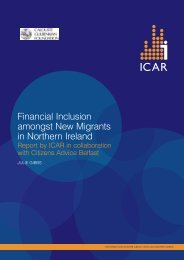Uncovered: assessing media and communications needs ... - ICAR
Uncovered: assessing media and communications needs ... - ICAR
Uncovered: assessing media and communications needs ... - ICAR
- No tags were found...
You also want an ePaper? Increase the reach of your titles
YUMPU automatically turns print PDFs into web optimized ePapers that Google loves.
Fig 2.3.4 Current sources of news <strong>and</strong> informationThe internet is a key source of news <strong>and</strong> information for all sectors. This fi nding coheres with theproportion of organisations that are connected to the internet <strong>and</strong> use broadb<strong>and</strong> [see 3.15].Notable ‘other’ sources of information are word of mouth, networking <strong>and</strong> liaising with the localcommunity, service users <strong>and</strong> members, e-bulletins <strong>and</strong> information from government <strong>and</strong> othernational organisations. One respondent – in the refugee/migrant category – said s/he got mostof their information by telephone. This suggests that the internet is the most effective means ofcommunicating news <strong>and</strong> information <strong>and</strong> an area in which training might be concentrated.Feedback from focus groups <strong>and</strong> interviews indicates that refugee <strong>and</strong> migrant worker, BME <strong>and</strong> faithcommunities get their news <strong>and</strong> information from <strong>media</strong> targeted at their own faiths or nationalities.These include weekly papers in Urdu, Arabic <strong>and</strong> other languages, <strong>and</strong> a range of radio <strong>and</strong> televisionchannels. Al Jazeera is a popular alternative to mainstream terrestrial channels, particularly its Englishspeakingversion. Other common information sources are campaigning organisations such as theNational Coalition of Anti-Deportation Campaigns, <strong>and</strong> independent <strong>media</strong> such as Indy<strong>media</strong>. 18Migrant workers were reported to have no interest in UK <strong>media</strong> except for the jobs pages. It wassuggested that experiments in producing foreign language supplements such as happened recently inDublin had proved popular.“A lot depends on word of mouth – people learning from other people’s experiences” – (BME supportworker)3.5 Contact with the <strong>media</strong>Refugees <strong>and</strong> migrant workers are least likely to be in contact with the local <strong>media</strong> <strong>and</strong> thoseresponding as ‘isolated rural’ most likely. Figure 4 also shows them to be the least likely to know howto contact the local <strong>media</strong> (although 57.6% say they do know how to contact the <strong>media</strong>, only 38.2%are actually in contact, suggesting perhaps some do not feel this is a priority or are unwilling to makethat contact).18 http://www.indy<strong>media</strong>.org<strong>Uncovered</strong>: <strong>assessing</strong> <strong>media</strong> <strong>and</strong> <strong>communications</strong> <strong>needs</strong> <strong>and</strong> capacity of marginalised communities19
















